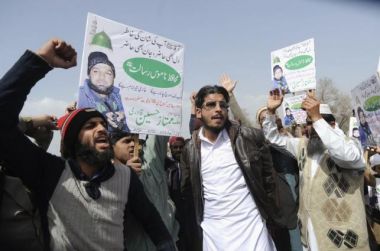Pakistan: Christians living in fear of retribution after Mumtaz Qadri's execution
Christians in Pakistan are living in fear following the hanging of Mumtaz Qadri, who murdered former Punjab governor Salman Taseer in 2011.

Nasir Saeed, director of the Centre for Legal Aid, Assistance and Settlement (CLAAS) which works on behalf of persecuted Christians in Pakistan, has warned that there may be "severe repercussions" for religious minorities in the country after Qadri's execution.
"Christians are scared and cautious," Saeed said. "The [Qadri's] execution will also enhance the threat to the lives of those who are charged under blasphemy law and are currently detained in various prisons."
Qadri fatally shot Taseer 28 times near his home in Islamabad in 2011 because the governor had spoken out against Pakistan's blasphemy law, saying it was being misused and should be reformed.
After his arrest, Qadri told police he killed Taseer for championing the cause of Asia Bibi, a Christian woman sentenced to death in a blasphemy case that arose out of a personal dispute.
Qadri's attorney said this week that his client told him he had no regrets for killing the governor.
"I have met him twice in jail. He said that even if Allah gave me 50 million lives, I would still sacrifice all of them," lawyer Ghulam Mustafa Chaudhry said.
Qadri was hanged at approximately 4.30am local time on Monday and street protests broke out hours later. Tens of thousands of Islamist supporters then gave him a martyr's funeral on Tuesday. He is considered a hero for defending the faith by some Muslim hardliners.
A crowd of at least 15,000 chanted "Qadri, your blood will bring the revolution" and "the punishment for a blasphemer is beheading" at the funeral in Rawalpindi, just south of Islamabad.
More than 100 people are charged with blasphemy each year in predominantly Muslim Pakistan, which stringently upholds the laws. Those accused of "defiling the Prophet Muhammad" face the death penalty, while life imprisonment is given for damaging the Quran. "Insulting another's religious feelings" can result in up to 10 years in jail.
Human rights groups say the blasphemy laws are frequently misused by extremists, however, and false charges brought against minority groups in order to settle personal scores or to seize property or businesses. No one has yet been hanged, but those convicted languish in prison.
Pakistan's Supreme Court warned last October that false accusations of blasphemy could be treated as seriously as blasphemy itself. In January this year, the head of the Council of Islamic Ideology, which advises the government on the compatibility of laws with Islam, suggested in an interview with Reuters that there may be a review.
However, Saeed said the Pakistani government "still hasn't shown any willingness to bring this matter to Parliament".
"In the past those who raised this matter in the parliament were threatened for their lives. If the government is sincere in stopping the misuse of the law, and the killing of innocent people, it must bring this law to parliament for change, or should at least introduce safeguards," he said.
He urged for greater protections for religious minorities, particularly for those already accused of blasphemy, including Asia Bibi and her family.
He warned that Qadri's hanging could have an impact on her case and that Islamists could demand severe action be taken against her.











